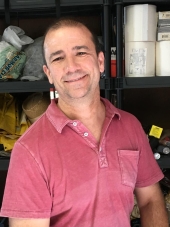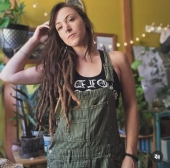posted 6 years ago
This post is going to be a tsunami of information. This is a description of the area in which I live and farm. I've provided a summary at the beginning, but it's still a lot to take in.
I currently live in rural Lewis County, Washington State. A lot of people post on permies trying to learn more about different areas they could live and start their own projects. I want to advocate for some of these people to consider my county or the surrounding areas. Not only will it solidly meet the criteria that many of you are setting, there are also a great many farms, businesses, and people (including me!) that exist out here that will help make your transition more successful.
Some of the pros of Lewis County:
Land is less expensive than other parts of Western Washington, yet urban areas are still very accessible. It's fifty minutes from where I am to Olympia, and an hour and a half (roughly) to Seattle and Portland
The soil in a lot of this and the surrounding counties is very good for no till farming. It's often a silt loam or in some places heavier. It unlocks well with the addition of organic matter. It doesn't seem to lend itself so well to tilled agriculture, which is why it's been preserved.
The terrain is very diverse and includes a lot of hills, mountains, and valley floors. There are a lot of options and a lot of fascinating ways to make permaculture work on different sites. The products yielded are also very diverse and reflect the different conditions and microclimates
We get plenty of rain, though in summer it barely rains at all.
We have a hot summer for growing things and winter is mild enough for winter gardening without a greenhouse
Diverse communities--I'm honestly not sure how to phrase this other than to just say it. Though Lewis county is majority white and overall Republican, there are queer people and people of color here, and more seem to be coming all the time. They include farm and business owners. The Hispanic and native American communities are both sizeable. If you're worried about or interested in what living out here is like, please message me. If I don't have personal experiences relevant to your questions I might know someone who does.
Access to markets. There are plenty of people in the cities (and sometimes closer) who are willing and able to pay for naturally grown food and cottage industry products. I'm not saying it's always easy or smooth, but businesses can be feasible if you work hard, market well, and get lucky
Diversity of agroforestry products. We're in zone 8 here, and people grow an incredible diversity of crops. In agroforestry alone people produce apples, pears, plums, cherries, peaches, hazelnuts, walnuts, chestnuts, figs, mushrooms, livestock of all kinds, berries of all kinds, bamboo (for eating and for building), hardy citrus, cranberries, and in the right microclimates, pomegranate, olives, almonds, and jujubes.
Description of the land:
If I were to describe Lewis county the words that would come to mind are terrestrial, riparian, and continental (riparian refers to the landscape and ecosystems around rivers). Ours is a land of rivers and mountains and rich soil. The summers are hotter than areas of Washington situated along the ocean, though the winters are a little colder as well due to the continental influence (still mild overall).
The landscape is rich with opportunities for foraging, hunting, and fishing. The forests yield edible mushrooms, berries of kinds, nettles, and even wild hazelnuts. Oak trees are also common. Native peoples used to process the acorns for food. I forage for blackberries and elderberries in particular. The rivers, lakes, and ponds have salmon, trout, carp, catfish, crayfish, and others. People hunt elk, bear, deer, and small game.
Existing infrastructure, community, and businesses:
Starting a homestead and/or business is hard. Even under "ideal" conditions it's difficult. The nice thing about this area is that there are plenty of people (like me! :) ) who have already moved out here and started farms and businesses. You can learn from us what works and what doesn't, and then move forward and make your own mistakes. There are established businesses that you can buy supplies from (Raintree and Burnt Ridge Nurseries are located here, for example). There are private individuals like me who often have seeds and scionwood available to sell, trade, or give away. I also know of experienced permaculture designers (not me) down here who are available for hire.
Downsides:
For now Lewis county is not very diverse and it's historically not very welcoming, though this is changing. I'm gay, and being out here can be daunting sometimes. Statistically Lewis county is majority white and conservative. But, all kinds of people are making their homes here and moving to the country.
Drought. Our summers are dry. Almost no measurable rain falls during these months. There are ways of overcoming this, but it is a reality to be aware of.
Transportation:
This county is well placed geographically. We have two major highways that connect us to the rest of the state, and Oregon. Interstate five runs North-South and connects us to places like Olympia, Portland, and Seattle. Highway twelve runs east to west and connects us to eastern Washington. We also have waterways that were used historically and that might be restored for travel and commerce. The chehalis river flows from the western part of the county into Gray's Harbor County and into the Pacific ocean. Like the Cowlitz River, the Chehalis used to see more cargo and passenger boats. There are people advocating for that to return, including for shipping farm goods. The cowlitz is another that flows from the north and eastern part of the county. It crosses most of the county and then flows south. It eventually reaches the Columbia River, and via the Columbia potentially connects us to Portland and the Pacific Ocean. Like the Chehalis it used to be used for trade, and hopefully will be again. This sort of traffic is not without impact on the environment, but is probably less than that of roads and railways.
Amtrak
Amtrak runs from Vancouver, Canada all the way down to California. Two train lines run through Centralia, a town in Lewis County (see below). It's possible to go to Portland or Seattle via these routes.
Town/city/area profiles:
Centralia/Chehalis
These are the two largest towns in the county. They’re close to one another and are beginning to merge. Both have nice downtowns with a lot of potential. A lot of money and talent are leaving the larger cities and beginning to make their way here, where it’s more affordable. There’s already a farm to table presence which includes some local sheep dairies. Amtrak has a station in Centralia, and there’s a public bus system in and around these towns.
Salkum/Onalaska
These are separate but relatively close together. Of the two of them, Onalaska is more of a town. It has a well-ranked public school system. I have friends out here who have farms. Both have excellent soil and a solid growing season. Onalaska is surprising in that it has a lot of people interested in natural medicine and alternative living. Both Salkum and Onalaska are peaceful and quiet. People are unobtrusive but not unfriendly, which I appreciate. They are near the Cowlitz River and Mayfield Lake. They both have access to highway 12 and 508, both of which connect to Interstate 5.
Randle/Packwood
Randle and Packwood are in eastern Lewis county. It's incredibly beautiful out there; both are in a mountain valley within the Cascades. Both sit along highway twelve, as does Morton (see below). But these two towns are also fairly remote. If memory serves me right it rains more out there, and the soil is also good. They're more accessible to eastern Washington (Yakima).
Morton
Morton is a town that is also situated in a pretty mountain valley. It's more remote than where I am, and less than remote than Packwood or Randle. I've heard good things about the community in Morton being tightly knit. Another gay man who grew up out there who says that he was accepted. I go to church here. If you buy land here be careful about orientation in terms of the sun. Some areas on the north side of the mountains get little to no sunlight in winter.
Rochester
Pe Ell/Winlock/Boisfort etc (east of I 5)
I know less about these. I have a friend who has a really incredible farm/set of projects out there. He has good soil too, and access to the Chehalis River. He sells in Portland and feels it’s not too far to be involved with the community there. Be aware of potential flooding in this area, though.
Olympia
Olympia is the capital of Washington state. It's a decent sized city and I like visiting it. It's built on the water (the southern Puget Sound). There's a lot of nice shops and restaurants in addition to all sorts of services. In terms of marketing there's a decent sized middle class made up of government workers and people in supporting service industries. A lot of them are at least casually interested in sustainability and healthy eating. It also has a great farmers market which acts as a hub of buying, selling, and networking.
Final Note
I grew up on the Olympic Peninsula. For those of you unfamiliar with the area, it’s a really wonderful place to live with a generally high quality of life. The towns up there are built between the mountains and the water, and have a large crowd of artsy, fun people who are often interested in the outdoors and sustainable living. I still really love it up there.
When I finished college I really wanted to move back but found that land (and taxes) were too expensive. Zoning was also too restrictive. I’ve talked with friends from all over who have had similar experiences in places like Seattle, the Skagit Valley, Ashland Oregon, and Asheville North Carolina. I realized that these places are “nice” because people like us made them that way (which then led to gentrification, another topic entirely). These places used to be like Lewis County, Remote, poor, and undeveloped. Then farmers, artisans, performers, and other creative productive types moved out to them and carved out a decent place to live. That’s what I’m trying to do here, and I invite you to do the same.
Some disclaimers:
This post is not intended as trying to detract from trying to live and farm anywhere else, and I hope it doesn't garner that sort of attention from anyone else. Each area has advantages and disadvantages
I'm not an expert on the areas I've mentioned. Some of what I wrote is fact, and some is my subjective impression. I invite anyone who lives or has lived in these areas to share their thoughts.
Please feel free to message me or post below with any questions.
Much of what I have to say about Lewis county also holds true for adjacent counties in western Washington.
When you reach your lowest point, you are open to the greatest change.
-Avatar Aang

 17
17




 7
7




 5
5




 2
2




 2
2




 1
1





 1
1










 1
1




 2
2




 3
3




 2
2




![Filename: rainfall_mapWA.jpg
Description: [Thumbnail for rainfall_mapWA.jpg]](/t/100135/a/70499/rainfall_mapWA.jpg)
 1
1




![Filename: rainfall_legend.jpg
Description: [Thumbnail for rainfall_legend.jpg]](/t/100135/a/70502/rainfall_legend.jpg)
 3
3




 2
2




 1
1








 1
1




 1
1




 2
2








 1
1




 1
1




 1
1








 2
2




 2
2




 2
2








 2
2




 1
1




 2
2








 2
2




 1
1




 3
3




 3
3








 2
2












